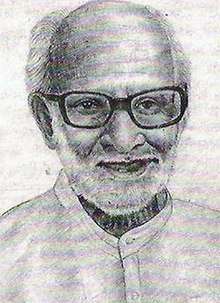Jivram Joshi
Jivram Bhavanishankar Joshi (6 July 1905 – 2004) was Gujarati language author of children's literature.[1]
Jivram Joshi | |
|---|---|
 | |
| Born | Jivram Bhavanishankar Joshi 6 July 1905 Garani village near Jasdan, Amreli district than under Baroda State of Gujarat |
| Died | 2004 Ahmedabad, Gujarat |
| Occupation | Author |
| Language | Gujarati |
| Nationality | Indian |
| Citizenship | India |
| Relatives | Bhavanishankar (father) Santokben (mother) |
Biography
He was born on 6 July 1905 at Garani village near Jasdan in Amreli district than under Baroda State of Gujarat to Santokben and Bhavanishankar. He and his brother Durlabhji were introduced at the school in Panosara village. His father died when he was studying in the third standard. He went to Ahmedabad from Saurashtra at early age. He was educated in Balwantray Thakore's Proprietary School near Teen Darwaza, Ahmedabad. He worked as cook at home of Ramnarayan V. Pathak. Inspired by the life of Dharmananda Damodar Kosambi, he went to Kashi in North India. He studied Sanskrit and English languages in 1927 at Kashi. He was introduced to Kashi Vidyapith also. He was involved in Indian independence movement. He evaded his arrest by moving to Bihar and later to Gujarat. He later started writing children's literature. He edited Zagmag, a Gujarati children's weekly.[2][3]
He died in 2004 at Ahmedabad, Gujarat.
Works
Joshi wrote abundance of literature for children. He created several fictional characters which became popular among children like Miya Fuski, Chhako Mako, Chhel Chhabo, Adukiyo Dadukiyo.[4] He wrote series of episodes on these characters like 30 episodes of Miya Fuski, 10 episodes of Chhako Mako, 10 episodes of Chhel Chhabo, 10 episodes of Adukiyo Dadukiyo. Miyan Fuski first appeared in 1946.[5] He also wrote 20 episodes in Prerak Prasangavartavali series and 10 episodes in Bodhmala series. His selected works were published under Balsahitya Sarvasangrah in 1936. His stories of Tabha Bhatt, Rani Chatura and Raja Vikram are also popular.[6] He wrote Ramat Gamat Geeto (play songs) (1952), songs to be sung while playing. He dramatised several of his stories like Chhako Mako (1963) and Panidar Moti (a bright pearl) (1965).[2][7]
Adukiyo Dadukiyo ane Galu Jaadugar was adapted into Gujarati film in 2008.[8] Miya Fuski characters are adapted into plays, TV series and a film.[9]
See also
References
- P. B. Mangla; Indian Library Association (1985). Building Library Collections and National Policy for Library and Information Services: Seminar Papers, Thirtieth All India Library Conference, Rajasthan University, Jaipur, January 28-31, 1985. Indian Library Association. p. 494.
- "સવિશેષ પરિચય: જીવરામ જોશી, ગુજરાતી સાહિત્ય પરિષદ". Jivram Joshi, Gujarati Sahitya Parishad (in Gujarati). Retrieved 17 March 2015.
- "બાળસાહિત્યકાર જીવરામ જોષી – ટીના દોશી". ReadGujarati.com (in Gujarati). 19 April 2010. Retrieved 17 March 2015.
- Peter Hunt (2 September 2003). International Companion Encyclopedia of Children's Literature. Routledge. p. 802. ISBN 978-1-134-87993-9.
- Ke. E. Jamunā; India. Ministry of Information and Broadcasting. Publications Division (1982). Children's literature in Indian languages. Publications Division, Ministry of Information and Broadcasting, Govt. of India. pp. 56, 57.
- The Indian P.E.N. 1955. p. 399.
- Ke. E. Jamunā; India. Ministry of Information and Broadcasting. Publications Division (1982). Children's literature in Indian languages. Publications Division, Ministry of Information and Broadcasting, Govt. of India. pp. 55, 60.
- "Straight from the art". India Today. 13 February 2008. Retrieved 17 March 2015.
- "Will literary adaptations make a comeback on TV?". The Times of India. 29 July 2014. Retrieved 17 March 2015.